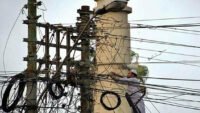Beijing, Oct 1 (AFP/APP):China’s Communist Party has defied the odds to retain firm control of power for 70 years, adapting to a changing world to outlast its comrades in the Soviet Union. As the People’s Republic of China celebrates its anniversary on Tuesday, here is a look at how the party has evolved over the years.
– Turbulent decades –
For almost three decades, China had its own style of rule: Maoism. Under the regime of PRC founder Mao Zedong, the state took over industries and farmers were organised into collectives.
The Great Leap Forward in 1958 — a mass mobilisation of labour to boost agricultural and industrial production — ended with the deaths of tens of millions of people in famine.
Mao launched the Cultural Revolution in 1966, a movement to demolish his political rivals that also turned into a disaster, with youthful Red Guards wreaking havoc across the country.
– Opening up –
Two years after Mao’s death, the Party abandoned Maoism and launched its “reform and opening up” policy under new paramount leader Deng Xiaoping in 1978.
The economy thrived following a series of market-oriented policies that allowed private capital and foreign investments.
The Party has had a “certain pragmatic recognition that regime survival depends upon economic performance, and economic performance requires interaction with the world economy”, said Sam Crane, a professor specialising in Chinese politics at Williams College in the US.
Millions of people have been pulled out of poverty while the country now boasts hundreds of billionaires and major homegrown companies such as internet giants Alibaba and Tencent.
– Tight control –
Under this “socialism with Chinese characteristics”, Ferraris roar down the streets of major cities where people can shop at luxury stores like Gucci.
But one thing has not changed — the Communist Party (CPC) holds tight to the reins of the economy.
Xi made clear in remarks last week that the country’s historic achievements “fully demonstrate that only the CPC can lead China”, according to state media.
Party “cells” are present in private companies and state-owned firms remain major players in the economy.
Even Alibaba’s billionaire founder, Jack Ma, is among the party’s 90.6 million members.
What if Karl Marx travelled through time to see today’s China?
“If Marx came back I think he would say that it is not ‘socialist’. That is, it is not moving in the historical direction of ‘communism’ but has settled into a rather rigid ‘state capitalism’ with strong authoritarian elements,” Crane said.
– Mao and Xi ‘Thought’ –
Another break from Mao was the end of one-man rule.
Deng backed a system of “collective” leadership and orderly succession following his death in 1997.
Jiang Zemin served two five-year terms as president, and his successor Hu Jintao complied with the new tradition.
But Xi has turned back the clock to become the most powerful leader since Mao.
Like the “Great Helmsman” before him, Xi has benefited from a state media-crafted cult of personality.
The country’s founder had “Mao Zedong Thought”. The current leader enshrined “Xi Jinping Thought on Socialism with Chinese Characteristics for a New Era” in the constitution.
Mao had the “Little Red Book”. Xi has his 21st-century version — an app dubbed “Study Xi”, featuring his teachings.
Xi has overseen a crackdown on graft that has punished more than 1.5 million party officials — a popular move among ordinary citizens but seen by observers as a chance to purge rivals.
Xi could be here to stay with the removal of presidential term limits.
– Crackdown party –
The opening of the economy has not been accompanied by political reforms. China marked another anniversary this year, one that the party made sure was not commemorated — the 30th anniversary of the brutal repression of pro-democracy protesters at Tiananmen Square.
The government has even tightened its grip on society under Xi, detaining activists, stepping up internet censorship, and refusing to free dissident and Nobel peace laureate Liu Xiaobo even while he was dying of cancer.
Authorities are increasingly using China’s development of technology such as facial recognition to monitor citizens. In the northwest region of Xinjiang, the mostly Muslim Uighur ethnic group has learned the hard way what it means to run afoul of the government.
More than one million people there are said to have been placed in internment camps in the name of combating terrorism.






